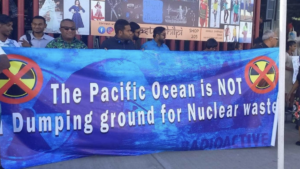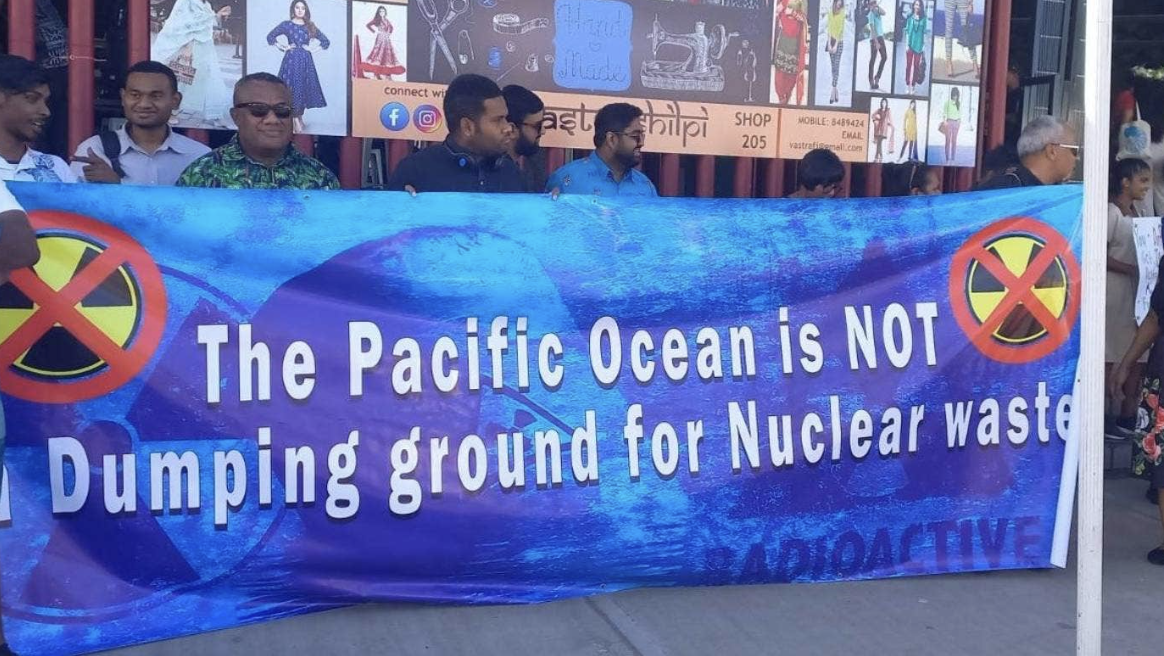
from stuff.co.nz
Driving into Wellington’s airport one may notice the landscape, the vast sea of green. If they were really paying attention, their attention would inevitably be redirected to a sign on a bank reading “Welcome to Wellington: A Nuclear-Free City,” a testament to the New Zealand Nuclear Free Zone established in 1987. New Zealand was not alone in its efforts, however — Belau, Vanuatu and the Solomon Islands have been nuclear-free since 1979, 1982 and 1983 respectively, and the Treaty of Rarotonga (which prevents member states’ possession and placement of nuclear weapons in the South Pacific) has been in place since 1986. However, this “nuclear-free zone” may be under threat with Australia’s new AUKUS deal and Japan’s plan to get rid of its nuclear waste in the Pacific. At first glance, none of this seems ground-breaking, but being nuclear-free holds immense importance to the Pacific. So what exactly is the importance of being nuclear-free in the Pacific? And what will be the consequences if it is threatened?
The significance of being nuclear-free dates back to the development of nuclear energy, or more specifically nuclear weapons. As the race for nuclear development ensued, powers who had colonies overseas, such as France and the United Kingdom, had a perfect location to test their weapons. The Pacific was a reasonable distance away from either country, so in case something went wrong, it would not affect French and British citizens. In the 1960s, France was testing nuclear weapons in French Polynesia (Mururoa Atoll), and as the two powers predicted, things went wrong. The estimated number of people affected by the testing is 110,000 – “almost the entire” population at the time – and the radioactive waste is believed to have led to an increase in thyroid cancer. Australia was another victim of the testing. South Australia and islands off of the Western Australian coast were subject to 21 British nuclear tests, exposing 1200 inhabitants to radiation.
It’s no real surprise that, after being treated like the guinea pigs of Europe, the countries of the Pacific developed a vehement aversion towards all things nuclear. Protests all over the Pacific, and especially in Aotearoa, arose in the 1960s and ‘70s, despite pushback from the colonial powers. In 1985 Greenpeace’s “Rainbow Warrior” was ready to sail off from Auckland to Mururoa to protest yet another French test when it was bombed by French foreign intelligence. The attack on the ship, which had been a representation of Pacific voices, exacerbated discontent towards French nuclear testing on the Pacific. It became such a key issue that it ended up determining the outcome of the 1984 elections in Aotearoa, giving power to the labour party who were vocally against nuclear weapons. The anger sparked by the bombing was justified. The Pacific region was receiving the brunt of nuclear innovation and when they pointed it out, they were subject to more attacks. It served as a reminder of the brutal reality of colonisation – it seemed that Pacific peoples were just discardable for the sake of development. As Pacific historians Dr Marco de Jong and Talei Mangioni put it, “Our nuclear-free status is tied in intimate ways to our political independence – and ultimately to our survival as peoples of the Pacific.” Eventually, concerns from protestors and politicians manifested themselves in legislation, and the nuclear-free status started popping up around the Pacific in the 1970s and ‘80s.
But this hard-fought nuclear-free paradise might not last much longer. In March 2023, Australia, the UK and the US revealed a submarine deal that would give Australia nuclear-powered attack submarines: the AUKUS deal. A defence strategy to deter “Chinese aggression,” it would allow for the passage of submarines through Australian – and by extension Pacific – waters. Jong and Mangioni comment that “the superpowers are working to undermine the independence and power of the Pacific Islands Forum and our nuclear-free status, which they see as an impediment to their military interests.” This puts Australia at odds with its Pacific neighbours and could be an important point in any of their future diplomatic discussions.
Another threat comes in the form of nuclear waste. Though nuclear energy seems like a promising solution to our climate troubles, all good things must come to an end. Nuclear power is no exception — no one knows what to do with nuclear waste. Until now at least, because Japan has recently come up with a new plan to release its nuclear wastewater into the Pacific Ocean. The first phase of the plan started in August of this year, with further plans to release more than one million tonnes of water over the next 30 years. Environmental scientists have raised concerns about one particular thing in the water: tritium, a radioactive element. It is safe in low amounts but even with low exposure its long-term effects on humans and the environment are still largely unknown. The plan technically meets the safety standards set by the International Atomic Energy Agency, but it has not won over everyone’s hearts. Some Pacific leaders are worried about the potential harmful effects and thousands of protestors have taken to voicing their concerns. In Aotearoa, protestors gathered outside the Japanese Consulate in hazmat suits holding signs condemning the plan and the lack of a response by the Aotearoa government.
The consequences of both the submarine deal and the nuclear waste plan are uncertain. In the world of geopolitics, these wounds are fresh and it remains to be seen if they will leave a lasting impact. With the new government in Aotearoa, it is possible that the AUKUS deal will expand to NZAUKUS, or that at the very least such discussions will begin. The South Pacific Forum (a forum created in 1971 for member states to discuss issues concerning the South Pacific) could also come to a new conclusion surrounding Fukushima’s wastewater, one that goes against Japan. One thing is for sure: the Pacific has once again had its decisions made for them, and one can only wonder if these acts are not only threats to a nuclear-free Pacific but a threat to Pacific independence itself.
Other posts that may interest you:
- Local Victories for Turkish Opposition — A Sign of Hope?
- Are France and Japan a Mismatch Made in Heaven?
- A Reflection on Dark Tourism
- Cadavre Exquis : Goodbye stranger
- An Untoward Progress?
Discover more from The Sundial Press
Subscribe to get the latest posts sent to your email.





